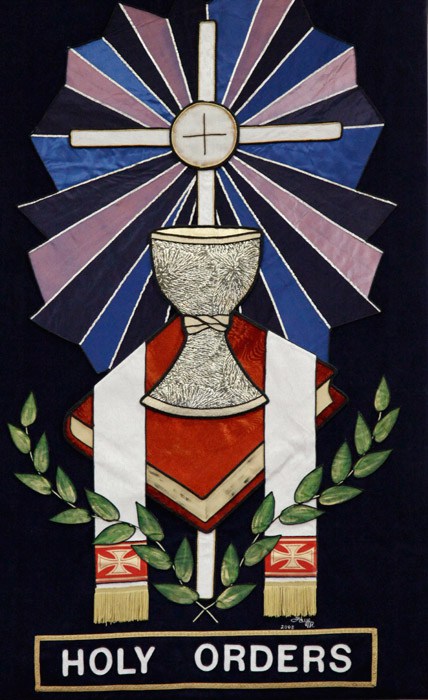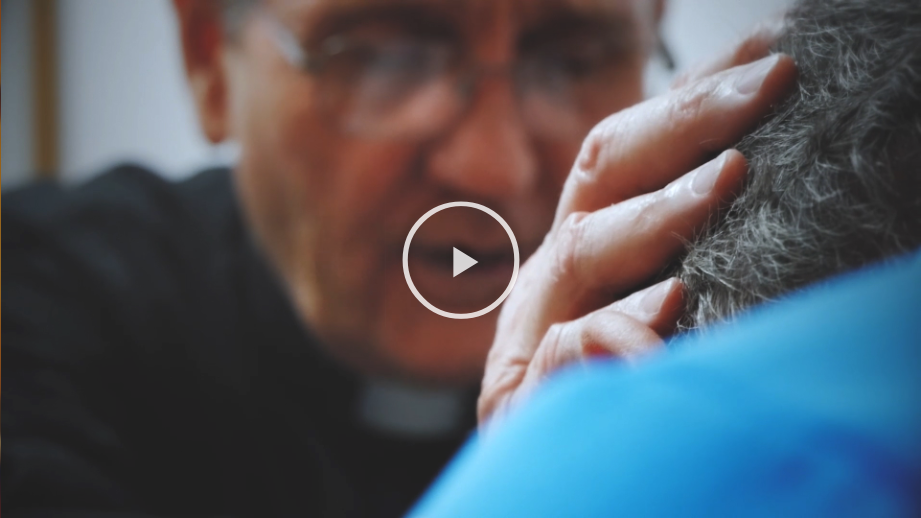
"Holy Orders is the sacrament through which the mission entrusted by Christ to his apostles continues to be exercised in the Church until the end of time: thus it is the sacrament of apostolic ministry. It includes three degrees: episcopate, presbyterate, and diaconate" (Catechism, 1536).
Sacrament of Holy Orders
The Priesthood
The sacrament of Holy Orders is a sacrament of service, in which a man places himself in service to Christ, his Church, and its people. The sacrament of Holy Orders is one of three sacraments, the other two being Baptism and Confirmation, in which the recipient receives a spiritual character (i.e., an indelible spiritual mark, which gives the recipient a new configuration to Christ). The effect of this sacrament, like Baptism and Confirmation, can never be undone. In the sacrament of Holy Orders this reconfiguration to Christ that takes place enables the priest to make Christ present sacramentally for the benefit of the Church and its people. "Priests are ordained to preach the gospel, shepherd the people of God, and celebrate the sacraments" (Lumen Gentium).
Young men who feel called by God to service in the Church as a priest can become a diocesan priest or religious order priest. A diocesan priest is ordained to serve the local church in which he is ordained. That is, a priest who is ordained in the Archdiocese of Philadelphia is ordained for service within this diocese. He is under the authority of the local ordinary. In the case of the Archdiocese of Philadelphia, that would be the Archbishop. A religious order priest is a member of a religious community, such as the Franciscan, Dominicans, or Trinitarians to name a few. Nearly one third of priests in the United States are order priests. An order priest is not ordained for service in a specific diocese, rather he is called to serve wherever his community serves in the universal Church. The type of service he engages in depends on the charism and mission of the religious community to which he belongs.
Men who feel called to the priesthood are encouraged to discuss this with a parish priest, or they may contact the:
Vocation Office for Diocesan Priesthood
100 East Wynnewood Road
Wynnewood, PA 19096
(610) 667-5778
www.heedthecall.org
There are far too many religious orders to list all of their vocation offices here. However, a parish priest or the Vocation Office for Diocesan Priesthood would be able to assist you in this matter.
The Diaconate
The Second Vatican Council restored the ancient order of the diaconate "as a proper and permanent rank in the hierarchy" (Lumen Gentium). Like priests, men who are ordained deacons in the Church receive the spiritual character that Holy Orders imparts. The deacon's role is one of service. "Among other tasks, it is the task of deacons to assist the bishop and priests in the celebration of the divine mysteries, above all the Eucharist, in the distribution of Holy Communion, in assisting at and blessing marriages, in the proclamation of the Gospel and preaching, in presiding over funerals, and in dedicating themselves to the various ministries of charity" (Catechism 1570).
All priests are first ordained deacons prior to being ordained priests. A deacon who is going on to the priesthood is often called a transitional deacon because he will eventually be ordained a priest. Hence their diaconate is one of transition. The Diaconate in this case is a part of the normal progression to the priesthood.
However, with the revisions of Vatican II, married and unmarried men are now able to be ordained to the Diaconate the rest of their lives. Hence their ordination to the diaconate is permanent. While men, both married and unmarried, may become Permanent Deacons in the Church, deacons are not permitted to marry once they are ordained. Therefore, to be a married deacon, a man must be married prior to being ordained a deacon. Should his wife predecease him once he is ordained, he may not remarry.
Men, both married and unmarried, who feel a call to serve the Church as a deacon should discuss the matter with a parish priest. Men must be between the ages of 35 and 55 at the time of application. For more information, visit the official website of the Archdiocesan Department of Permanent Deacons, or contact them directly at the address below:
Department of Permanent Deacons
Saint Charles Borromeo Seminary
100 East Wynnewood Road
Wynnewood, PA 19096
(610) 664-2213
I Will Follow
I Will Follow, is a short film created by Ascension Press as part of their Altaration: The Mystery of the Mass Revealed program. It was made into a standalone video in order to help encourage men to see priests a "real" men from the real world and to encourage then to consider a vocation to the priesthood. It is a powerful film about how God's call to the vocation of priesthood is unique and how living your life as a priest can be life changing not only for the priest, but also for the people to whom he ministers.
Heed the Call
We are blessed in the Archdiocese of Philadelphia with numerous examples of good and holy men, whom God has called to the priesthood. The Vocation Office for the Diocesan Priesthood, in partnership with Joyful Films, is excited to launch a new video about one such priest whose compassion, understanding, and empathy characterize his. Fr. Douglas McKay, was ordained a priest for the Archdiocese of Philadelphia in 1982. Following various parish assignments, Fr. Doug founded Our House Ministries in the Grays Ferry section of Philadelphia in 1997 and currently still serves as Chaplain. As 'the living and transparent image of Christ the priest' (JPII), Fr. Doug uses the power of prayer and the sacraments in his outreach to those who are struggling with addition.

We invite you to watch and see how Fr. Doug has received and transmitted the mercy, forgiveness, and love of God in his ministry. In this time when there is so much bad news reported about priests and bishops, it is important to be renewed in the power that our Lord Jesus works through the ordained priest, wonderfully exemplified by Fr. Doug.